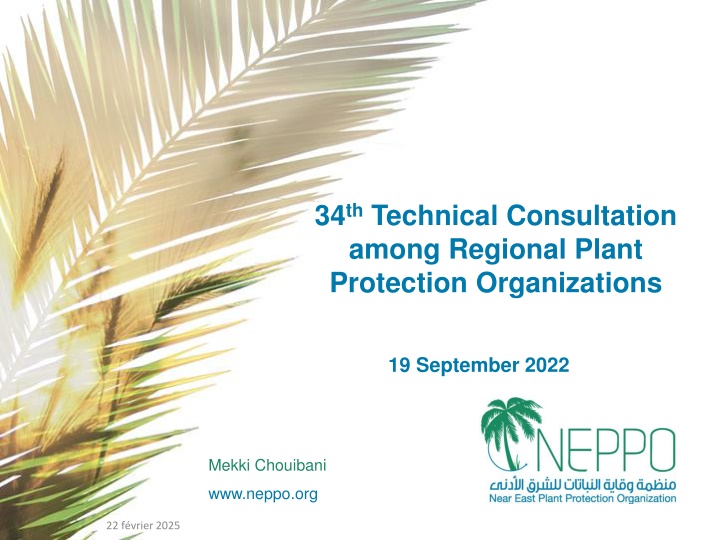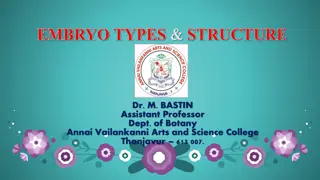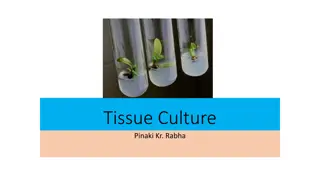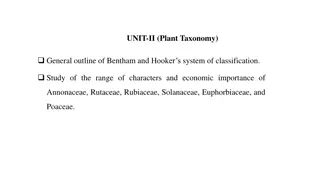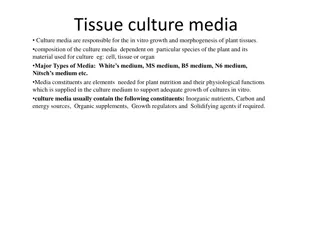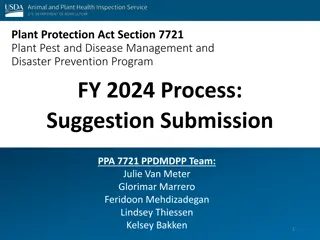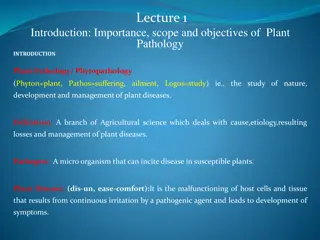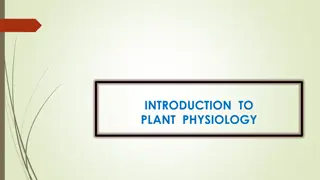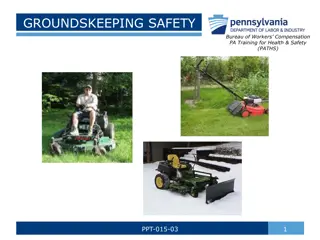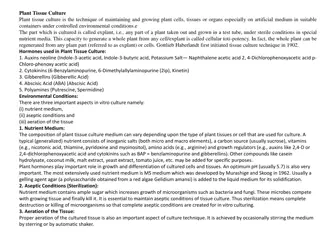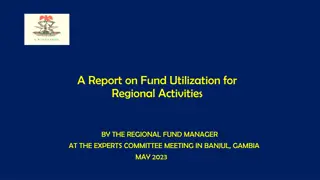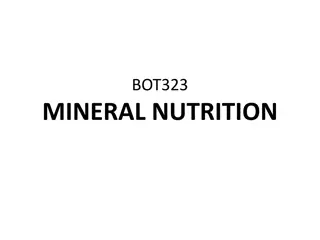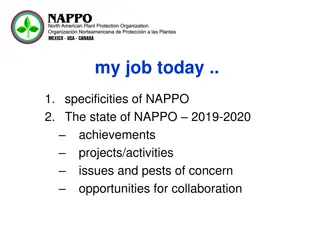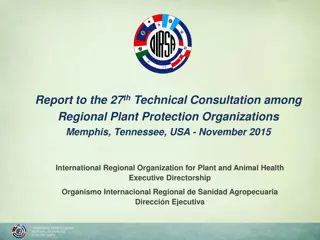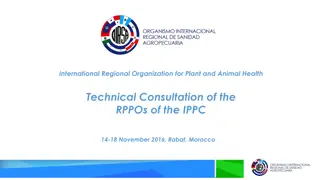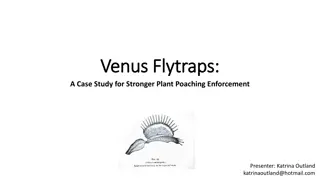NEPPO Regional Plant Protection Organization Overview
NEPPO, the North Africa and Near East Plant Protection Organization, focuses on promoting regional cooperation among members to prevent pest spread, control pests, and facilitate safe trade. The organization has achieved significant milestones in technical and capacity development through workshops, training courses, and participation in virtual meetings. By harmonizing regulations and enhancing capacity building, NEPPO plays a crucial role in safeguarding plant health in the region.
Download Presentation

Please find below an Image/Link to download the presentation.
The content on the website is provided AS IS for your information and personal use only. It may not be sold, licensed, or shared on other websites without obtaining consent from the author.If you encounter any issues during the download, it is possible that the publisher has removed the file from their server.
You are allowed to download the files provided on this website for personal or commercial use, subject to the condition that they are used lawfully. All files are the property of their respective owners.
The content on the website is provided AS IS for your information and personal use only. It may not be sold, licensed, or shared on other websites without obtaining consent from the author.
E N D
Presentation Transcript
34thTechnical Consultation among Regional Plant Protection Organizations 19 September 2022 Mekki Chouibani www.neppo.org 22 f vrier 2025
1. Specificities Agreement signed in February 18, 1993 entered into force on January 8, 2009 Recognized officially in March 2012, by 7thCPM: Heaquarter: Rabat Members: Algeria, Egypt, Jordan, Iraq, Libya, Morocco, Pakistan, Oman, Sudan, Syria and Tunisia Signed but not ratified: Iran, Mauritania*, Y men, (Mauritania submitted its instrument of adhesion to FAO- DG) Executive Committee: Algeria, Jordan, Libya, Pakistan, Syria, Tunisia Staff: Executive Director, Assistant director 2 22 f vrier 2025
NEPPO aims to. Promote regional cooperation and capabilities of its members through : Preventing the spread and introduction of pests Controlling pests in an appropriate manner Facilitate safe regional and international trade By: 1. promoting information exchange (Pest status, pest report, regulations, phytosanitary measures, ..); 2. harmonizing phytosanitary regulations and measures 3. developing regional strategy to face spread and introduction of pests 4. enhancing capacity building of NPPO 3 22 f vrier 2025
2. Technical and capacity development achievements-1 Organization of virtual workshops Opuntia cochineal, September 16, 2021 Citrus Black spot, September 16, 2021 Green scale of date palm, October 07, 2022 Participation in the webinars on prevention, preparedness and response guidelines for fall army worm, October 2021 - - - Organization of high-level virtual meeting on Xylella fastidiosa, January 26, 2022, Cairo declaration Organization of a training course on the active and better participation at IPPC meetings, February 28, 2022 Organization of Pre-CPM meeting, March 1-3, 2022 Organization of training on biological control of locusts, Agadir, May 16-20, 2022 (Participation of 11 countries for CLCPRO and CRC) with EMPRES (FAO), CLCPRO and CRO, Participation in the regional meeting on FAW (Monthly meetings) 4 22 f vrier 2025
2. Technical and capacity development achievements-2 Participation in the regional meeting on Red Palm Weevil (Monthly meetings), Preparation of a guideline for phytosanitary measures at borders and on the territory against Red Palm Weevil and a pest-free area protocol for Red Palm Weevil Gather and dissemination of information in real-time and as much as possible Participation and contribution to the IC strategic team for PCE Representing RPPO in the IPPC Focus Group on Communication Participation at CPM 16, April 5,7, and 21, 2022 Participation at the 60th meeting of the Working Party on Phytosanitary Regulations. Paris, 2022-06-21/24 22/02/2025 5
3.1. Xylella fastidiosa Serious threat to regional agriculture, food security, and biodiversity Continental Jump 500 host plants (Olive: 9999200 ha (ADAO), small stakeholders about 90% Severe damage Spread in Europe 3.2. Fall Armyworm Continental jump: America, Africa, Asia Host plant 80 mainly maize, Rice Importance of the host plants crops for food and feed supply and area cultivated in all the region. Severe damage and high potential of spread Newly detected in Saudi Arabia 22/02/2025 6
3.3. Red Palm Weevil Continental jump: Asia, Africa, Europe Importance of Date palm: 1039750 ha and the presence of Ornamental palm Severe damage: 2009: 1,74-8,69 Mi USD Gulf region (Removal), Murcia 7 Mi Euros Spread in the South of Europe, Contained in Morocco and Tunisia Development of guidelines for phytosanitary measures at borders and on the territory against red palm weevil Development of a pest-free area protocol for red palm Weevil 3.4. Opuntia cochineal Very severe damage: on prickly pear cactus Opuntia ficus-indica Spread in North Africa, Jordan, Lebanon, Israel, Palestine, New outbreak in Yemen N. Nasr 22/02/2025 7
Thank you, Gracias, Merci B timent C de l INRA, Angle Avenues Ibn Al Ouazzani et Hassan II, Rabat Phone: +212 (0)6 73 99 78 08 +212 (0)5 37 70 48 10 Fax: Email: hq.neppo@gmail.com +212 (0)5 37 70 87 63 hq.neppo@gmail.com Web Site: www.neppo.org
